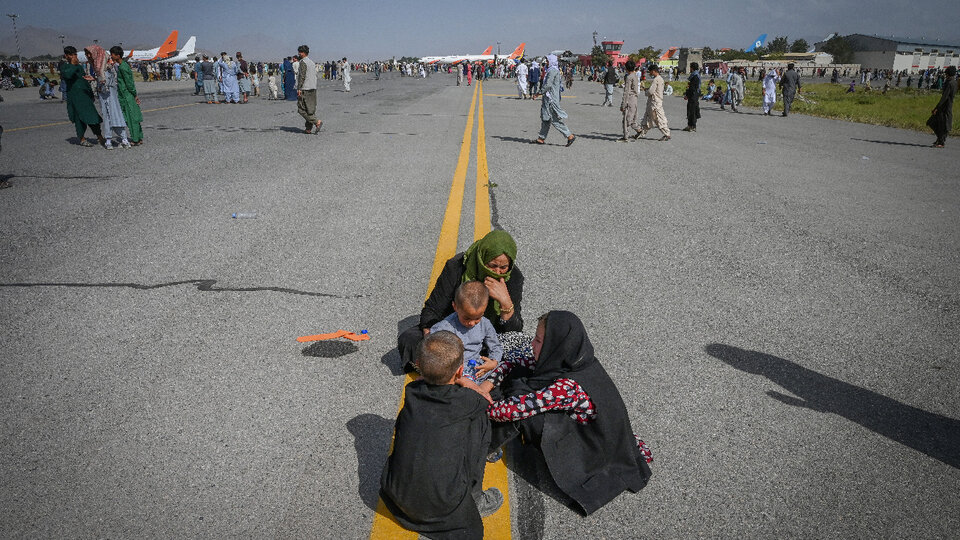
[ad_1]
Of Public, special for Page 12
the afghan women constitute the most vulnerable sector of the Afghan population and the victory of the taliban it places them in the same miserable situation they had until the Western invasion in 2001, because of their rigorous interpretation of Islam, questionable and contrary to the opinion of the majority of Muslims.
The women’s rights are called into question againAs when the Taliban ruled from 1996. Women over 8 years old were not allowed to go to school and until that age they could only read the Koran. Education was only available to men. They were also prohibited from appearing in public without covering their entire body with the burqa and without the company of a male relative.
Women who break these regulations can be flogged in public and can even be executed. However, in recent months Taliban leaders said if they won the war they would legislate to allow women to participate in public life, which represents a complete novelty compared to the past, although it will be necessary to wait to see if the promise is confirmed and to what extent it is realized, something that many Afghans doubt.
“The intention is to empower women to contribute to the good of the country in a peaceful and protected environment,” Taliban spokesman Zabihullah Mujahid said in May. Other Taliban leaders have spoken in the same direction. If this happens, the change in the living conditions of women will be significant, although it is evident that they will continue to have extreme limits in developing compared to Western women and those in other Muslim countries.
In rural and urban areas under the control of the Taliban, women have become real prisoners.
The Afghans are the first to be suspicious of these promises, and even speak of “betrayal” of the international community. Women’s rights activist Fawzia Koofi, who was a member of parliament and part of the government delegation that unsuccessfully negotiated peace with the Taliban before the US troops withdrew, is very pessimistic.
“Women in Afghanistan are the segment of the population most at risk,” said Koofi recently, who views the Taliban as “criminals” and that prisoners released by the Taliban in recent days pose a great risk to women. . as well as those who challenge the power that women have gained over the past 20 years. ” “Women have a dark future ahead of them”, forecast.
In rural and urban areas that fell to the Taliban, women have become real prisoners, not in prisons but at home, since they can only leave them in the company of a male relative and in the framework of restrictions of all kinds. In practice, any woman who dares to go out risks being arrested and punished. In addition, they do not have the right to education, the right to be teachers and the right to work.
During the Taliban rule in the 1990s, fundamentalist leaders prohibited women from performing any type of work outside the home., a ban that responds to an overly rigorous interpretation of Islam, which did not even exist at the time of the Prophet Muhammad, when his first wife, Khadijah, owned and operated a caravan business that carried out commercial shipments throughout the region.
In a letter published this week, Afghan women called on the international community to intervene to address the oppression suffered by women and girls in areas already occupied by the Taliban, and they denounce that the Taliban force them to marry the fighters within the framework of forced marriages, which the Taliban deny and qualify as “false propaganda” ”.
However, there are indications that the Taliban behave in this matter in one way or another depending on the area. In July and in Badakhstan and Takhar provinces, local Taliban leaders asked religious leaders in the region to compile a list of women over 15 and widows under 45 to marry fighters. The Taliban plan envisages re-educating these women in the Islam they profess.
The fear of women increased as the Taliban advanced through Afghan territory.
International law explicitly prohibits sexual abuse. Article 27 of the Geneva Convention says: “Women must be specially protected against any attack on their honor, in particular against rape, forced prostitution or any other form of indecent assault.
An unknown number of families with young girls are fleeing their cities for fear of being forced into marriage. This fear exists throughout Afghanistan and is growing as the Taliban advance and conquer new territories. The achievements of the past two decades in educating girls and employing women are under threat.
In a highly patriarchal and misogynistic society, women are forced to cover their faces whenever they are in public because “a woman’s face is a source of corruption” for men. The specter of government that lasted from 1996 to 2001 returns. Thus, according to Amnesty International, 80% of marriages were forced. Two decades later, some Taliban say that from now on things will be a little different, but women are the most vulnerable segment of the population.
.
[ad_2]
Source link
 Naaju Breaking News, Live Updates, Latest Headlines, Viral News, Top Stories, Trending Topics, Videos
Naaju Breaking News, Live Updates, Latest Headlines, Viral News, Top Stories, Trending Topics, Videos